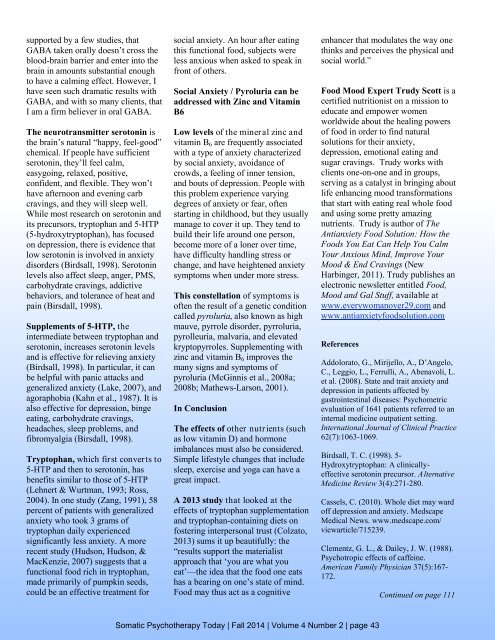SPT-Fall2014
SPT-Fall2014
SPT-Fall2014
You also want an ePaper? Increase the reach of your titles
YUMPU automatically turns print PDFs into web optimized ePapers that Google loves.
supported by a few studies, that<br />
GABA taken orally doesn’t cross the<br />
blood-brain barrier and enter into the<br />
brain in amounts substantial enough<br />
to have a calming effect. However, I<br />
have seen such dramatic results with<br />
GABA, and with so many clients, that<br />
I am a firm believer in oral GABA.<br />
The neurotransmitter serotonin is<br />
the brain’s natural “happy, feel-good”<br />
chemical. If people have sufficient<br />
serotonin, they’ll feel calm,<br />
easygoing, relaxed, positive,<br />
confident, and flexible. They won’t<br />
have afternoon and evening carb<br />
cravings, and they will sleep well.<br />
While most research on serotonin and<br />
its precursors, tryptophan and 5-HTP<br />
(5-hydroxytryptophan), has focused<br />
on depression, there is evidence that<br />
low serotonin is involved in anxiety<br />
disorders (Birdsall, 1998). Serotonin<br />
levels also affect sleep, anger, PMS,<br />
carbohydrate cravings, addictive<br />
behaviors, and tolerance of heat and<br />
pain (Birsdall, 1998).<br />
Supplements of 5-HTP, the<br />
intermediate between tryptophan and<br />
serotonin, increases serotonin levels<br />
and is effective for relieving anxiety<br />
(Birdsall, 1998). In particular, it can<br />
be helpful with panic attacks and<br />
generalized anxiety (Lake, 2007), and<br />
agoraphobia (Kahn et al., 1987). It is<br />
also effective for depression, binge<br />
eating, carbohydrate cravings,<br />
headaches, sleep problems, and<br />
fibromyalgia (Birsdall, 1998).<br />
Tryptophan, which first converts to<br />
5-HTP and then to serotonin, has<br />
benefits similar to those of 5-HTP<br />
(Lehnert & Wurtman, 1993; Ross,<br />
2004). In one study (Zang, 1991), 58<br />
percent of patients with generalized<br />
anxiety who took 3 grams of<br />
tryptophan daily experienced<br />
significantly less anxiety. A more<br />
recent study (Hudson, Hudson, &<br />
MacKenzie, 2007) suggests that a<br />
functional food rich in tryptophan,<br />
made primarily of pumpkin seeds,<br />
could be an effective treatment for<br />
social anxiety. An hour after eating<br />
this functional food, subjects were<br />
less anxious when asked to speak in<br />
front of others.<br />
Social Anxiety / Pyroluria can be<br />
addressed with Zinc and Vitamin<br />
B6<br />
Low levels of the mineral zinc and<br />
vitamin B 6 are frequently associated<br />
with a type of anxiety characterized<br />
by social anxiety, avoidance of<br />
crowds, a feeling of inner tension,<br />
and bouts of depression. People with<br />
this problem experience varying<br />
degrees of anxiety or fear, often<br />
starting in childhood, but they usually<br />
manage to cover it up. They tend to<br />
build their life around one person,<br />
become more of a loner over time,<br />
have difficulty handling stress or<br />
change, and have heightened anxiety<br />
symptoms when under more stress.<br />
This constellation of symptoms is<br />
often the result of a genetic condition<br />
called pyroluria, also known as high<br />
mauve, pyrrole disorder, pyrroluria,<br />
pyrolleuria, malvaria, and elevated<br />
kryptopyrroles. Supplementing with<br />
zinc and vitamin B 6 improves the<br />
many signs and symptoms of<br />
pyroluria (McGinnis et al., 2008a;<br />
2008b; Mathews-Larson, 2001).<br />
In Conclusion<br />
The effects of other nutrients (such<br />
as low vitamin D) and hormone<br />
imbalances must also be considered.<br />
Simple lifestyle changes that include<br />
sleep, exercise and yoga can have a<br />
great impact.<br />
A 2013 study that looked at the<br />
effects of tryptophan supplementation<br />
and tryptophan-containing diets on<br />
fostering interpersonal trust (Colzato,<br />
2013) sums it up beautifully: the<br />
“results support the materialist<br />
approach that ‘you are what you<br />
eat’—the idea that the food one eats<br />
has a bearing on one’s state of mind.<br />
Food may thus act as a cognitive<br />
enhancer that modulates the way one<br />
thinks and perceives the physical and<br />
social world.”<br />
Food Mood Expert Trudy Scott is a<br />
certified nutritionist on a mission to<br />
educate and empower women<br />
worldwide about the healing powers<br />
of food in order to find natural<br />
solutions for their anxiety,<br />
depression, emotional eating and<br />
sugar cravings. Trudy works with<br />
clients one-on-one and in groups,<br />
serving as a catalyst in bringing about<br />
life enhancing mood transformations<br />
that start with eating real whole food<br />
and using some pretty amazing<br />
nutrients. Trudy is author of The<br />
Antianxiety Food Solution: How the<br />
Foods You Eat Can Help You Calm<br />
Your Anxious Mind, Improve Your<br />
Mood & End Cravings (New<br />
Harbinger, 2011). Trudy publishes an<br />
electronic newsletter entitled Food,<br />
Mood and Gal Stuff, available at<br />
www.everywomanover29.com and<br />
www.antianxietyfoodsolution.com<br />
References<br />
Addolorato, G., Mirijello, A., D’Angelo,<br />
C., Leggio, L., Ferrulli, A., Abenavoli, L.<br />
et al. (2008). State and trait anxiety and<br />
depression in patients affected by<br />
gastrointestinal diseases: Psychometric<br />
evaluation of 1641 patients referred to an<br />
internal medicine outpatient setting.<br />
International Journal of Clinical Practice<br />
62(7):1063-1069.<br />
Birdsall, T. C. (1998). 5-<br />
Hydroxytryptophan: A clinicallyeffective<br />
serotonin precursor. Alternative<br />
Medicine Review 3(4):271-280.<br />
Cassels, C. (2010). Whole diet may ward<br />
off depression and anxiety. Medscape<br />
Medical News. www.medscape.com/<br />
viewarticle/715239.<br />
Clementz, G. L., & Dailey, J. W. (1988).<br />
Psychotropic effects of caffeine.<br />
American Family Physician 37(5):167-<br />
172.<br />
Continued on page 111<br />
Somatic Psychotherapy Today | Fall 2014 | Volume 4 Number 2 | page 43


